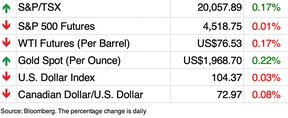Ontario home sales hit lows of the great financial crisis

No region in the country is feeling the housing slowdown more

Article content

Article content
Nowhere in Canada is the chill of the cooling housing market as deep as in Ontario.
Home sales in this province fell for the fifth straight month in October to reach the lowest levels since the Great Financial Crisis, excluding the pandemic shutdown, RBC economist Robert Hogue said after the release of Canadian Real Estate Association data Wednesday.
That has put nearly half of local centres including Greater Toronto Area, Hamilton, Niagara, Barrie and Kingston in a buyer’s market, bringing prices down.
Advertisement 2
Article content
Over the past three months, the MLS Home Price Index for Ontario has fallen at an accelerating pace, dropping 1.4 per cent in October, said Hogue.
Though Ontario has been hit the hardest the toll of higher borrowing costs and eroding affordability is showing up across the country.
So much for that spring rebound.
Canada’s housing market has now given back almost three quarters of the sales gains earlier this year when the Bank of Canada paused interest rate hikes from February to May, said Desjardins principal economist Marc Desormeaux.
Nationally home sales have dropped nearly 12 per cent over the past four months, including the 5.6 per cent decline in October.
“This, along with a growing number of homes put up for sale since spring, has entirely unwound the tightness in demand-supply conditions that prevailed earlier this year. And buyers are taking advantage of their stronger bargaining position,” said Hogue.
The national MLS Home Price Index fell 0.4 per cent month over month in September and 0.8 per cent in October, he said.
Even Alberta, home to some of the hottest housing markets in the country, is slowing. Home sales here fell 8.3 per cent in October from the month before, said Hogue. Sales were down 9.2 per cent in super-hot Calgary.
Article content
Advertisement 3
Article content
National new listings dropped 2.3 per cent in October, their first decline in six months, easing concerns that homeowners were being forced to sell because of unsustainable debt.
But as more Canadians renew their mortgages at higher rates over coming months, “the financial squeeze could prompt a growing number of existing owners to sell their property. This would pose a risk to the market if a wave of sellers ensued,” said Hogue.
The weakness in the housing market is expected to continue well into next year. If higher borrowing costs do force more sellers to market, prices will continue to decline, especially in Ontario and British Columbia, said Hogue.
Ultimately, it will take a Bank of Canada interest rate cut to turn the market around, economists say, and most don’t expect that until mid-2024.
But it could be sooner.
Economist David Rosenberg’s team predict the central bank will have to cut in the first half of next year because of Canada’s “looming mortgage renewal cliff.”
“A large increase in average monthly mortgage payments will arise from the nearly $1 trillion in renewals due by 2026, triggering, in turn, a large demand shock and putting stress on the housing market in particular and the economy in general,” wrote Dylan Smith, a senior economist at Rosenberg Research & Associates Inc.
Advertisement 4
Article content
The Rosenberg team calculates that the average monthly mortgage payment, already up 30 per cent since early 2022, will rise by another 15 per cent by the end of 2024, 30 per cent by the end of 2025 and 45 per cent by the end of 2026.
“It’s … very hard to picture the governing council not being aware of the storm on the horizon, and not concluding that rates will need to ease in anticipation of the mortgage renewal cliff to avoid a deep and prolonged crisis (rather than a mild corrective recession),” wrote Smith.
_____________________________________________________________________
Was this newsletter forwarded to you? Sign up here to get it delivered to your inbox.
_____________________________________________________________________


At last, one area where Canada has an edge over its southern neighbour. The Bank of Canada’s Senior Loan Officer survey for the third quarter, which measures the credit appetite of major financial institutions, revealed that credit conditions here have tightened only slightly in recent quarters.
Not so in the United States, where a large majority of lenders have tightened credit conditions for six quarters in a row, said National Bank economist Matthieu Arseneau.
Advertisement 5
Article content
“There is reason to believe that, in the wake of the banking crisis earlier this year, fragilized regional banks in the U.S. are much less inclined to extend commercial credit, especially in the context of the current economic uncertainty and commercial real estate exposures,” said Arseneau.
National predicts “a significant period of weakness” for the U.S. economy in months ahead.

- Prime Ministers Justin Trudeau attends APEC Economic Leaders’ Meeting
- Environment Minister Steven Guilbeault and Jennifer Morgan, Germany’s state secretary and special envoy for international climate action, will provide an update on collective progress toward the US$100 billion international climate finance goal through to 2025
- Canadian housing starts come out today, offering a look at how homebuilding is progressing as the country struggles with affordability.
- Today’s Data: U.S. initial jobless claims, U.S. trade price indices, Philadelphia Fed Index, industrial production and capacity utilization
- Earnings: Bath & Body Works, Walmart, Applied Materials
Get all of today’s top breaking stories as they happen with the Financial Post’s live news blog, highlighting the business headlines you need to know at a glance.
Advertisement 6
Article content


_______________________________________________________

Anne-Marie is worried her current investments won’t get her to the magic $1 million by the time she turns 65 — but it might not matter. Family Finance finds the solutions.
Recommended from Editorial
-

Canada’s menacing mortgage math means crisis looming
-

Canada home prices slide as homebuyers go into ‘hibernation’
____________________________________________________
Today’s Posthaste was written by Pamela Heaven, @pamheaven, with additional reporting from The Canadian Press, Thomson Reuters and Bloomberg.
Have a story idea, pitch, embargoed report, or a suggestion for this newsletter? Email us at posthaste@postmedia.com, or hit reply to send us a note.
Bookmark our website and support our journalism: Don’t miss the business news you need to know — add financialpost.com to your bookmarks and sign up for our newsletters here.
Article content
link








